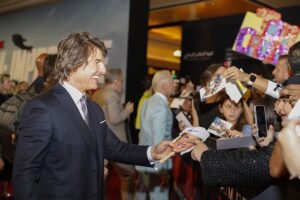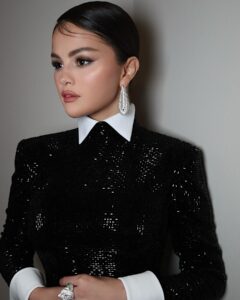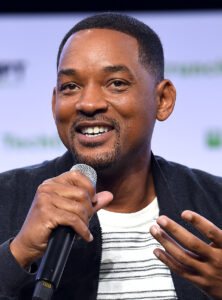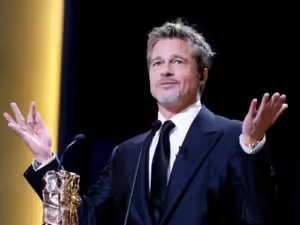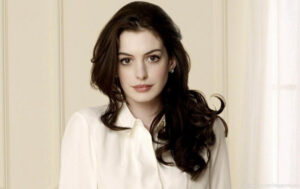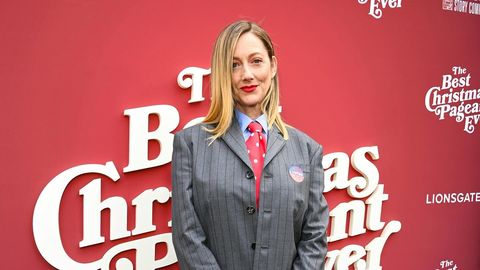
Judy Greer, a talented actress known for her versatile roles, recently revealed an intriguing piece of her career history that many fans may not know.
The Audition That Could Have Been
In a conversation with Jesse Tyler Ferguson, who portrayed Mitchell Pritchett on “Modern Family,” Greer shared that she was once considered for the role of Claire Dunphy.
The Risk of Typecasting
At the time, Judy Greer was in her thirties and had already experienced a successful career in films.
She had come to terms with playing motherly roles but felt that auditioning for a character who was a mother of three posed a significant risk.
Greer expressed her concerns about being typecast as “America’s mom.”
“In a movie, people kind of see it and then they forget,” she explained.
However, she felt that a role in a TV show would forever label her as a mother.
This thought process led her to the difficult decision not to audition for the role of Claire Dunphy.
Personal Life Influences
Interestingly, Greer mentioned that she didn’t even want kids at that time.
Her perspective on motherhood and family life influenced her decision significantly.
Now, as a stepmom to her husband’s two grown children, her views have evolved.
She reflected on how her past feelings about motherhood played a role in her career choices.
The Appeal of a Movie Career
Another major factor in Greer’s decision was her enjoyment of the travel that came with being a movie actress.
She loved the freedom to explore different places and meet diverse people through her film work.
Being tied to a single set for a long-running television series felt limiting to her.
“I was like, ‘Well, I like traveling a lot, and I like doing all these movies,’” she said.
This lifestyle preference played a crucial role in her choice to step away from the audition for Claire Dunphy.
The Success of Modern Family
Despite Greer’s decision, Julie Bowen ultimately won the role of Claire Dunphy.
Bowen’s portrayal of the character became iconic, earning her two Primetime Emmy Awards for her performance.
Greer’s career, however, continued to flourish.
She has become known for her roles as a supporting character in various films, including “13 Going On 30” and “27 Dresses.”
Her ability to play the best friend or frenemy has made her a beloved figure in Hollywood.
A Guest Appearance on Modern Family
Interestingly enough, Judy Greer did land a role in “Modern Family” despite not auditioning for Claire.
In the show’s first season, she guest-starred as Denise, the ex-girlfriend of Phil Dunphy, played by Ty Burrell.
This role allowed her to be part of the show without the long-term commitment that she initially feared.
Reflections on Career Choices
Judy Greer’s journey highlights the complexities of career decisions in Hollywood.
Her story resonates with many actors who face similar dilemmas about typecasting and personal preferences.
Greer’s choice not to pursue the role of Claire Dunphy speaks volumes about her understanding of her career and personal life at that time.
It’s a reminder that sometimes, the paths we choose lead us to unexpected opportunities.
The Implications of Typecasting for Actors in Hollywood
Typecasting is a term often heard in the entertainment industry, referring to the practice of repeatedly casting an actor in the same or similar roles.
This phenomenon has significant implications for actors in Hollywood, affecting their careers, personal lives, and the overarching narratives presented in film and television.
Understanding Typecasting
Typecasting occurs when an actor becomes closely associated with a specific character archetype.
For example, an actor known for playing a tough cop may find it challenging to break out of that mold.
This can limit the diversity of roles they can portray and reduce their overall career opportunities.
For many, this is frustrating and can lead to a sense of being trapped in a single identity as an artist.
The Nature of the Hollywood Industry
Hollywood thrives on familiarity.
Producers and studios often seek actors who have already succeeded in certain roles, leading to a cycle where typecasting becomes prevalent.
Audiences tend to feel comfortable with actors they recognize, which can further entrench typecasting.
As a result, studios may be less willing to take risks on actors who are not viewed as “safe” choices for their productions.
Career Limitations
One of the most significant implications of typecasting is its impact on an actor’s career trajectory.
When an actor is typecast, they may struggle to obtain diverse roles, limiting their ability to showcase their range and versatility.
This can result in fewer opportunities for leading roles and, in some cases, may even lead to a decrease in an actor’s overall marketability.
The Stigma of Typecasting
Typecasting also carries a cultural stigma.
Actors who are frequently typecast may be perceived as one-dimensional.
This perception can affect not only their career prospects but also how they are treated in the industry.
It becomes increasingly difficult for typecast actors to change public perception of their abilities, even if they are talented in a variety of roles.
Personal Impacts on Actors
Beyond professional ramifications, typecasting can also have personal effects on actors’ mental health and self-esteem.
When actors find themselves repeatedly offered the same types of roles, they may feel pigeonholed or undervalued.
The Pressure to Conform
This can create immense pressure to conform to audience expectations and industry norms, potentially stifling their creativity.
Actors may feel compelled to accept roles that they would otherwise decline, leading to dissatisfaction with their work.
The inability to explore varied characters can create frustration and even resentment.
Examples from the Industry
Many well-known actors have faced the challenges of typecasting throughout their careers.
For instance, John Wayne was frequently associated with the rugged cowboy archetype.
Despite his substantial acting talent, he often found it difficult to break away from this mold.
Similarly, typecasting has affected actors like Robin Williams, who transitioned from comedic roles to serious ones later in his career.
Such examples highlight the broader implications of typecasting and its potential to hinder actors’ professional growth.
Breaking Free from Typecasting
Despite the challenges posed by typecasting, some actors have successfully broken free from these constraints.
Renée Zellweger, known for her romantic comedy roles, took significant risks by starring in serious dramas and eventually won an Oscar for her performance in “Judy.”
Zellweger’s trajectory showcases that breaking away from typecasting is possible, but it often requires bold choices and support from industry insiders.
Strategies to Combat Typecasting
Awareness of typecasting has led to conversations about how actors can navigate these pitfalls.
Actors can seek diverse roles that challenge their established image.
Networking and building relationships with directors and writers who appreciate their versatility can also create opportunities to break away from established patterns.
The Role of Representation
Additionally, as Hollywood becomes more inclusive, the opportunities for diverse storytelling increase.
This shift allows actors of different backgrounds to take on roles that may not fit traditional character archetypes, which helps combat typecasting.
The evolution of media landscapes, including streaming services, further creates space for new types of narratives and character exploration, providing actors with varied opportunities.
How Personal Life Choices Influence Career Decisions in the Entertainment Industry
In the entertainment industry, personal life choices play a significant role in shaping an individual’s career path.
These choices can range from familial relationships and educational pursuits to lifestyle preferences and mental health considerations.
Understanding how these factors interact with one’s career can shed light on the decisions made by actors, directors, and producers in Hollywood.
Family Dynamics and Career Choices
Family is often a central influence in an individual’s life, and this is particularly true in the entertainment industry.
Many actors come from artistic backgrounds, where exposure to the arts can ignite a passion for performance.
Support Systems
Support from family can often encourage aspiring actors to pursue their dreams.
This encouragement may manifest as financial support to attend acting schools or simple emotional backing during audition processes.
Conversely, those from families who prioritize stability over artistic endeavors may face pressure to choose more traditional career paths.
For some, fulfilling familial expectations can mean sacrificing personal aspirations, leading to tension or resentment.
Parenting Choices
Moreover, personal choices surrounding parenting can also shape career decisions.
Actors who decide to start families may find themselves at a crossroads.
Balancing work commitments in a demanding industry with family responsibilities can be challenging.
Some may choose to take on fewer roles or opt for projects that allow for better work-life balance.
Education and Training
Education plays a crucial role in shaping the careers of many individuals in the entertainment industry.
For aspiring actors, attending acting schools or universities can provide essential training and networking opportunities.
The Importance of Formal Training
Formal education in the arts can equip individuals with skills that enhance their performance.
Actors who undergo rigorous training often feel more prepared to tackle diverse roles and complex characters.
This training can offer a competitive edge in a crowded field, allowing them to stand out during auditions.
Alternative Pathways
However, not everyone follows a traditional educational path.
Some actors find success without formal training, relying instead on life experiences, auditions, and perseverance.
These personal choices indicate a more individualized approach to career-building, demonstrating that there are multiple routes to success in the entertainment industry.
Lifestyle Choices and Career Impact
Lifestyle choices also significantly influence career decisions in Hollywood.
The fast-paced, demanding nature of the entertainment industry requires professionals to make daily choices about health, relationships, and overall well-being.
Health and Well-Being
Actors who prioritize physical health often pursue roles that require significant physical conditioning or maintain strict diets.
Such choices can lead to positive career outcomes, as being in excellent shape may open doors to action roles or leads in major films.
On the other hand, neglecting personal health can result in burnout, impacting both performance and career longevity.
Networking and Social Life
Furthermore, networking in the entertainment industry is often synonymous with lifestyle choices.
Actors and professionals may find that social gatherings, industry parties, and networking events become essential for career advancement.
Choosing to engage in these social scenes, while sometimes overwhelming, can lead to valuable connections that may result in auditions or roles.
Mental Health Considerations
Mental health is an essential factor that increasingly influences personal life choices in the entertainment industry.
The pressures of fame, public scrutiny, and the demands of a chaotic schedule can take a toll on actors’ mental well-being.
Navigating Public Awareness
Many entertainers are now more open about their mental health struggles.
Personal choices related to mental health, such as seeking therapy or prioritizing self-care, can significantly impact career decisions.
Actors who prioritize mental health may choose to step back from their careers for periods of time, allowing them to recharge mentally and emotionally.
The Stigma of Mental Health
Despite progress in this area, there is still a stigma surrounding mental health in the entertainment industry.
Some may feel pressured to maintain a façade of perfection, leading to career choices that do not align with their well-being.
Making a conscious choice to prioritize mental health over career advancement can be a courageous decision, reflecting deep personal values and priorities.
The Interplay of Choices
The entertainment industry is complex, with personal life choices and career decisions intricately intertwined.
Actors constantly navigate between their personal lives and the demands of their profession.
Case Studies
For example, many actors have made significant career shifts based on life changes.
When an actor becomes a parent, they may seek roles that allow for more flexible schedules or roles that reflect their new experiences.
Other actors might find a new passion in directing or producing, leading to a career change influenced by their evolving personal lives.
What Makes a Character Iconic in Television Shows?
Television has given us a plethora of characters that have left a lasting impact on audiences worldwide.
Some of these characters become iconic, resonating with viewers long after the show has ended.
But what exactly makes a character iconic in television shows?
Character Development
One of the foundational elements that contribute to a character’s iconic status is their development throughout the series.
Viewers often connect deeply with characters who undergo significant growth or transformation.
Relatable Struggles
When characters face challenges, failures, and triumphs, it mirrors the human experience, making them more relatable.
For instance, characters like Walter White from “Breaking Bad” showcase profound change, evolving from a mild-mannered teacher to a ruthless drug kingpin.
This compelling arc captures audience attention and fosters investment in the character’s journey.
Complexity and Depth
Iconic characters often have layers of complexity.
Their motivations, flaws, and vulnerabilities make them multi-dimensional.
Think of characters like Tony Soprano from “The Sopranos,” who navigates the duality of family life and criminality.
This complexity allows viewers to explore different facets of the character, contributing to their lasting appeal.
Memorable Quotes and Catchphrases
Another hallmark of iconic television characters is their ability to deliver memorable quotes or catchphrases.
These lines often encapsulate the essence of the character or the show, becoming ingrained in popular culture.
Impactful Language
For example, who can forget Joey Tribbiani‘s iconic line, “How you doin’?” from “Friends“?
Such phrases not only define the character but also create a cultural touchstone that resonates with fans.
Memorable quotes can often be repeated and referenced in everyday conversation, further solidifying a character’s place in pop culture.
Cultural Commentary
Many iconic characters serve as vehicles for social commentary, addressing important issues through their narratives.
This relevance to societal themes can elevate them beyond mere entertainment.
Reflecting Society
For example, characters like Jessica Pearson from “Suits” embody the struggles and triumphs of women in leadership positions.
By navigating challenges in a male-dominated field, she becomes a symbol of empowerment, resonating with audiences seeking representation and relatability.
Characters that reflect societal trends and challenges often gain an iconic status as they embody what viewers are experiencing in their lives.
Signature Style and Memorability
The visual aspect of a character often contributes to their iconic status.
Distinctive style or look can make a character instantly recognizable.
Unique Aesthetics
Think of characters like Sheldon Cooper from “The Big Bang Theory,” whose quirky wardrobe and signature t-shirts define his persona.
This visual identity becomes part of the character’s legacy.
Iconic characters often possess unique traits, hairstyles, or fashion choices that fans can immediately recognize.
Strong Relationships and Dynamics
Relationships with other characters can also elevate an individual character’s status to iconic levels.
Characters who forge strong bonds create memorable dynamics that resonate with audiences.
Chemistry and Interactions
For example, the partnership between Mulder and Scully in “The X-Files” became iconic due to their strong chemistry and complementary personalities.
Their interactions captivated viewers, leading to an enduring fandom that celebrates their iconic status as a duo.
These dynamics deepen emotional connections, making characters more memorable.
Cultural Impact and Longevity
An iconic character often maintains cultural relevance long after their original show has concluded.
Characters that continue to influence or inspire new generations exemplify this impact.
Embracing a Legacy
For instance, characters from classic sitcoms like Lucy Ricardo from “I Love Lucy” have influenced comedic styles and character development for decades.
The legacy of these characters often leads to reboots, spin-offs, or references in contemporary storytelling, indicating their lasting significance.






